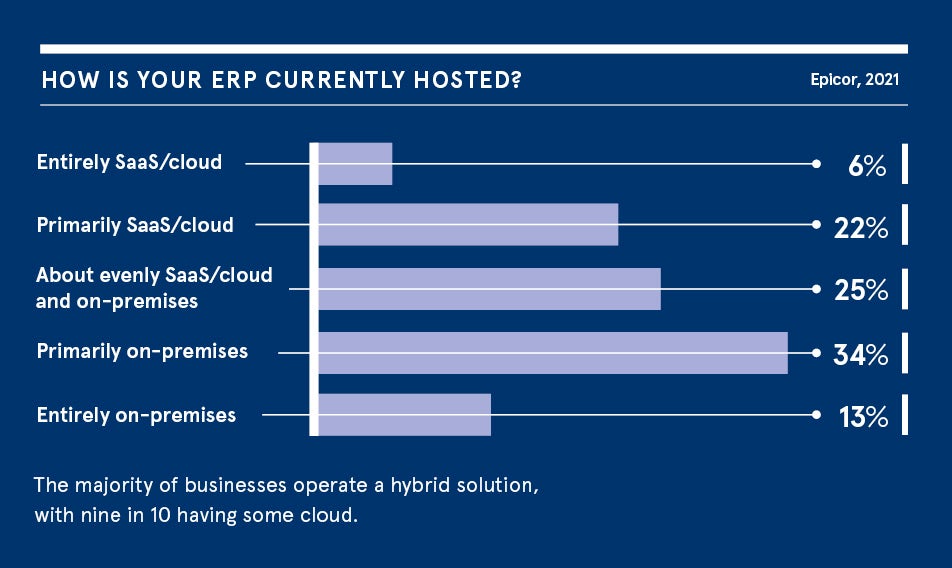
Digital transformation and the rapid shift to home working during the pandemic have pushed cybersecurity up the corporate agenda. In fact, it’s now rare to find a business that doesn’t consider powerful security a top priority. So how can they ensure their data is backed up, protected and only available to the right people?
Here’s the short answer: use the cloud. In the age of distributed workforces and ever-increasing cyber threats, it’s the best way to ensure that important data is secure and accessible only to those who need it, when they need it.
Because cloud providers continuously update their servers to combat the newest cyber threats, they’re able to stay two steps ahead of hackers too. By contrast, on-premises solutions can be harder to protect, straining finances and resources. And don’t forget that on-premise servers are more prone to break-ins or natural disasters too.
It’s therefore hardly surprising that almost nine in 10 businesses surveyed for Epicor’s recent Industry Insights Report believe their data is safer in cloud-based solutions. So have fears that migrating to the cloud involved a loss of control over your data finally faded away?
“Cloud usage continues to grow at a rapid clip in virtually every vertical and across all geographies, a very good indication that many of the myths about cloud security risks have been successfully dispelled,” says Rich Murr, chief information officer at Epicor, which provides cloud ERP and business management solutions to the world’s most essential businesses. “Where they do persist, it’s often a reflection of an outdated understanding of cloud providers’ security capabilities.”
Cloud providers know that earning their customers’ trust and business means their security offering must withstand intense scrutiny, and have invested large sums to ensure that it does.
“While the same robust security capabilities that cloud providers offer can also be implemented and operated on-premise, the cost and level-of-effort to do so is highly prohibitive. Whether it’s encryption, multi-factor-authentication, web-filtering, intrusion detection and prevention, or the dozens of other security technologies needed for a layered defence, cloud providers offer a level of technical prowess and scale that is increasingly difficulty for all but the largest of enterprises to duplicate,” says Murr.
Epicor’s report revealed that businesses consider encryption and multi-factor authentication to be the cloud’s two most useful security features, with monitoring a close third. When you consider that cloud security patches and management tools are constantly being updated too, it’s easy to see why businesses that want to protect themselves from security issues know that a cloud solution is the way to go.
With the cloud, data is consistently backed up in separate servers that are often thousands of miles apart. By contrast, backups and redundancy are often found to be lacking with on-premise solutions at the worst possible moment – for example, when they’re needed to recover from a hardware failure, ransomware attack, data corruption, or another event that renders a system unusable.
“SaaS providers design a level of data protection into their solutions that is highly reliable, and IaaS providers offer numerous data protection options that can be leveraged to virtually guarantee your data can be retrieved and restored in the event data is compromised,” says Murr.
Migrating to the cloud can streamline compliance with data security regulations too. “Most enterprise-class cloud providers insulate customers from the underlying technical complexity associated with designing, delivering, and operating compliant solutions, allowing customers to more easily and cost-effectively achieve compliance than attempting to do the same with on-premise solutions,” says Murr.
Ultimately, no business can afford to cut corners when it comes to the security of their data and systems: the cost of regulatory fines and risk of reputational damage is simply too high. But thanks to the cloud, they can rest assured that their data is secure, easily recoverable and protected against the latest threats.
Please contact us at www.epicor.com
Sponsored by

Digital transformation and the rapid shift to home working during the pandemic have pushed cybersecurity up the corporate agenda. In fact, it’s now rare to find a business that doesn’t consider powerful security a top priority. So how can they ensure their data is backed up, protected and only available to the right people?
Here’s the short answer: use the cloud. In the age of distributed workforces and ever-increasing cyber threats, it’s the best way to ensure that important data is secure and accessible only to those who need it, when they need it.
Because cloud providers continuously update their servers to combat the newest cyber threats, they’re able to stay two steps ahead of hackers too. By contrast, on-premises solutions can be harder to protect, straining finances and resources. And don’t forget that on-premise servers are more prone to break-ins or natural disasters too.

